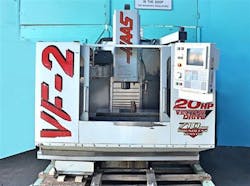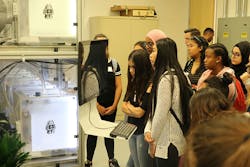Recently, I wrote about how the Walt Disney Co. donated $1 million to the Boy and Girls Club of America to create STEM Centers of Innovation in Oakland, Calif., and 11 other metropolitan areas in need of some educational enhancement. The move was tied to the conclusion of Black Panther, in which the high-tech nation of Wakanda built a science outreach center in Oakland, which, in real life, I really hope they call a “STEMbassy.” The movie itself could be seen as an allegory of the ethical obligations an advanced society has to help the less fortunate.
Such philanthropy, though a relatively small gesture compared to the film’s box office gross, is a step in the right direction—and one manufacturers can learn from. The institutions your future workers attend need access to the advanced equipment you will want them to use. For context, high school football players use pads and cleats and the same type of ball that the pros use, but just less-expensive models. “Industrial athletes,” a term I totally stole from Boeing, should be just as prepared.
And sometime they are. Many school districts invest in 3D printers and even CNC machines, a very positive development for the machining industry. And every time a district can drop even $20,000 on a used Haas CNC machine, for example, that could provide dozens of students a path to a very stable career. The worst outcome of a student not being able to find a job is turning to criminal activity to make ends meet. The average one-year cost of incarceration is around $32,000. I understand the tax money comes from different sources, but in this scenario, offering just one at-risk student a different path provides a 160% ROI.
But for far too long, many have been ill-equipped to glean even the basics of math and science, let alone advanced manufacturing, using outdated text books and PCs so old they unironically have Oregon Trail installed on them. From 2009 on, the Program for International Student Assessment (PISA), taken by 15-year-olds every three years, shows a gradual decline in math and science scores. It’s a statistically insignificant drop, under 4%, but I’d argue that if it’s not getting better year-over-year as technology improves and public scrutiny is higher, the education system overall is failing.
Parts of it work really well. Some would say they are the best in the world. But these tests measure how all students are doing. If some students are doing really well, then how bad the ones doing bringing the average down? Children have been left behind.
Now I think we can unanimously agree that the government won’t be solving this problem for you, and I hope you never expected it to. This is your problem to fix, American manufacturers, and these are your future workers to reach. You are being tested right now, and as an industry, deserve a failing grade, too.
We All Failed
On a recent trip to Ireland for the opening of Combilift’s new forklift factory (which you'll hear all about soon), I talked with more than a dozen people entrenched in the American supply chain, from the wood industry in the Northern United States to oil refinery suppliers in Houston. In Wisconsin, where that big Foxconn plant will be soon, I was told some manufacturers can’t even keep workers employed more than two hours before the new hires decide it’s too hard and turn tail. And this is a $16/hour assembly job with two weeks of paid vacation. If the people you want for your entry-level positions are acting like this, how entitled are the ones with degrees?
Sure, these kids may have awful parents, and smartphones and video games and Justin Bieber are also to blame, but maybe, just maybe, manufacturers took it for granted that there’d be a steady stream of workers who had both a solid work ethic and probably a new family to support. Meanwhile, a 2016 Harvard study found a third of Millennials support socialism. Heck, a stat like that means the media failed mightily, too, but this is still about you, manufacturing.
“America’s manufacturing companies do too little to promote manufacturing as an exciting and rewarding career for both salaried and hourly positions,” Larry E. Fast, president of Pathways to Manufacturing Excellence, recently stated in a contributed piece to IndustryWeek.
He offers several ways to rectify the situation, but I’ll distill it into: Get involved with your local schools and community colleges.
I’ll add to what Fast recommends. Contact local shop teachers and maker space directors. Find out what equipment they’re using, what they need, and how you can help via donating that older machining gear collecting dust in the corner, or inviting students in on weekends for workshops. That last one will probably yield the most useful data. You’ll find out what they’re good at and what they’re not. You
That’s not to say manufacturers aren’t proactive in this regard, because I’ve reported on regions that are, through tours and outreach. Northern Wisconsin stands out here. And manufacturing executives serve on boards and use personal time to broaden diversity and increase awareness of the industry. It was just the topic of Lincoln Electric’s CEO Chris Mapes’ keynote at our Manufacturing & Leadership Conference & Expo in Raleigh, and Toyota Mississippi’s president Sean Suggs not only addressed STEM in his opening speech, but met with local MAGNET school students afterwards.
“We need to help students at that young age to see there’s a career ladder for them in manufacturing,” says Suggs, who helped deploy Advanced Manufacturing Technician (AMT) program at Toyota Mississippi.
Since 2013, 42 students have completed the training. That’s still a long way from the estimated 2 million manufacturing jobs that Deloitte predicts will go unfulfilled by 2025. But it’s a start.
The Next Step: Triage, Triage, Triage
If I were desperate for workers, I would look for people desperate for work. One in five children in the U.S. live below the poverty line. As of 2016, there were 30.4 million participating in the National School Lunch Program.
Wouldn’t it be most sensible, if you lack workers, to focus on those who could benefit the most from high-paying jobs with often minimal introductory education? And by focus, I mean don't forget. Maybe you send your mechatronics expert to the nearby private school to talk about how cool robotics are because your kid goes there. Maybe you think that's your good deed for the year and you solved the skills gap. If that's the case, maybe you should find out what your area's worst performing school is, and send a team of engineers to talk about how awesome robots and 3D printing and machining are, or get them to see for themselves at the plant.
The risk is zero, as where you were born or how much money your family has doesn’t diminish your potential. It’s the basis of our society, or at least it used to be.
The reward is that you inspire kids who have nothing and are told they are nothing that they can learn how to actually make the future happen right on your factory floor.
Cynics and iconoclasts can deride this American dream on Twitter and Karl Marx birthday parties all they want, but that doesn’t change the fundamental truth that anyone can be successful in manufacturing if they are willing to learn and put in the work.
The problem is manufacturers have to be willing to learn about this new generation of workers, and put in the work to convince them a manufacturing career is the way to go.
Steering children in underserved neighborhoods, especially girls, towards tech is something Joanne Moretti, Jabil’s CMO and GM of Radius Innovation and Development consultancy group, has been doing since she moved to the U.S. from Canada in 2008. She’s made it her mission to evangelize the merits of STEM to one million girls by 2021. The Top 100 Media Influencer, as named by OnAnalytica, estimates she is 25% of the way there through workshops, school visits, social media, etc.
Currently, Blue Sky brings in high school groups nearly every week to help Moretti reach that goal of 1 million. It's an amazing tech wonderland I got to visit last summer. Check out my photo gallery HERE.
When Moretti began her quest, she worked for CA, Inc. and lived in Marin County, where the median family income was second highest in California. But she volunteered in a less-affluent area with Oakland’s Junior Achievement program, part of an international organization “dedicated to educating students about workforce readiness, entrepreneurship and financial literacy through experiential, hands-on programs.”
Back then, she started with just a few schools. The kids had such amazing ideas that “they literally gave me goosebumps,” she recalls, although she couldn't quite remember the exact ideas.
What she does remember is that they impressed her. Conversely, what she found out shortly after depressed her: Oakland’s dropout rate was 40%.
“When I heard that and I looked at this talent sitting in the room and I thought about that statistics, it just made my stomach turn,” she says.
Moretti says her kids, who went to public school, had several laptops for student use, “an abundance of technology,” in the school library, while in Oakland schools, there were the “odd, old laptop or PC,” she observed.
While she couldn’t fix all the problems, she could make a difference. Recently in Chicago at a Radius STEM event, Moretti taught more than just how robots or computers work, but fundamentals of manufacturing, starting with the 4 D’s: discovery, design, development and delivery. They used these factors to discuss how a backpack is made.
Then they progressed into how these help a customer and what need they solve. Theoretically, teens who see problems in their neighborhoods will be better equipped to solve them. Empowered with the right skills and tech knowhow, they will make the lasting change intimated at in Black Panther.
“We try to instill that into the kids when we work with them have a purpose,” Moretti says. “If they think about the purpose instead of just about the technology, then the idea hopefully is that they're going to go back to that community with something really meaningful.”
Now that's something that should give you goosebumps.
About the Author
John Hitch
Senior Editor
John Hitch writes about the latest manufacturing trends and emerging technologies, including but not limited to: Robotics, the Industrial Internet of Things, 3D Printing, and Artificial Intelligence. He is a veteran of the United States Navy and former magazine freelancer based in Cleveland, Ohio.
Questions or comments may be directed to: [email protected]



